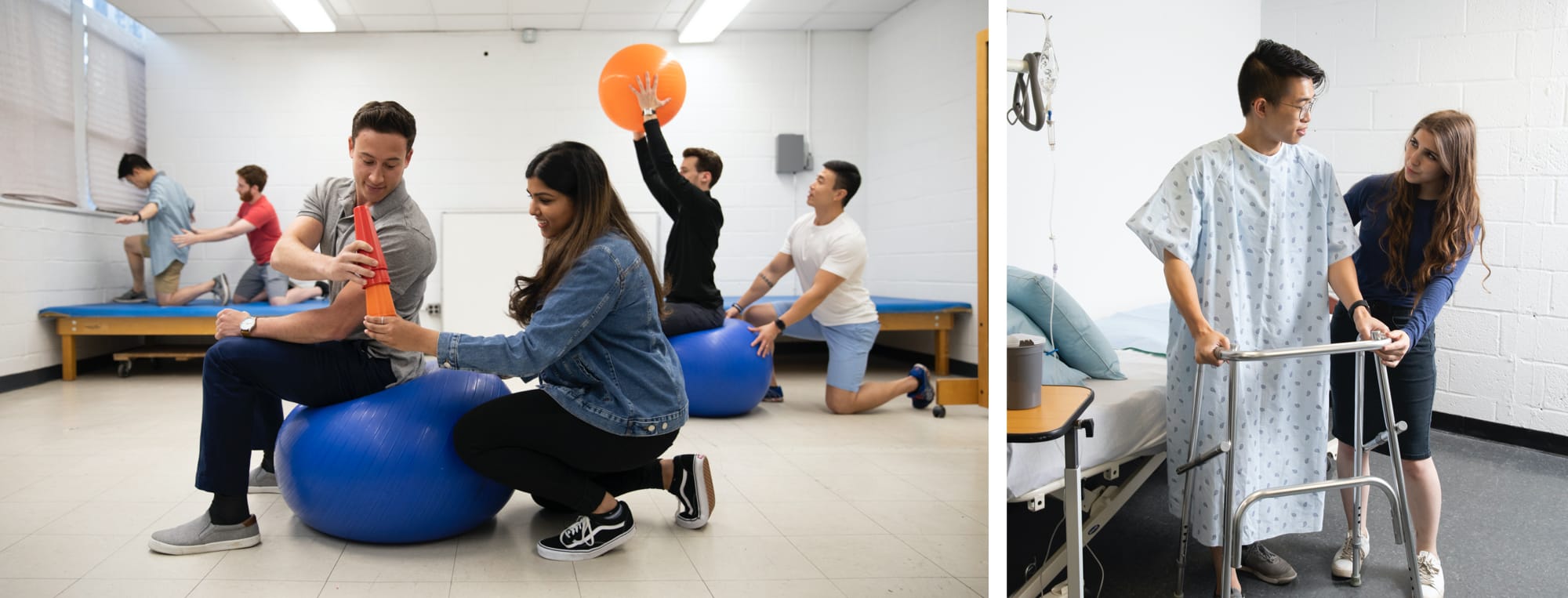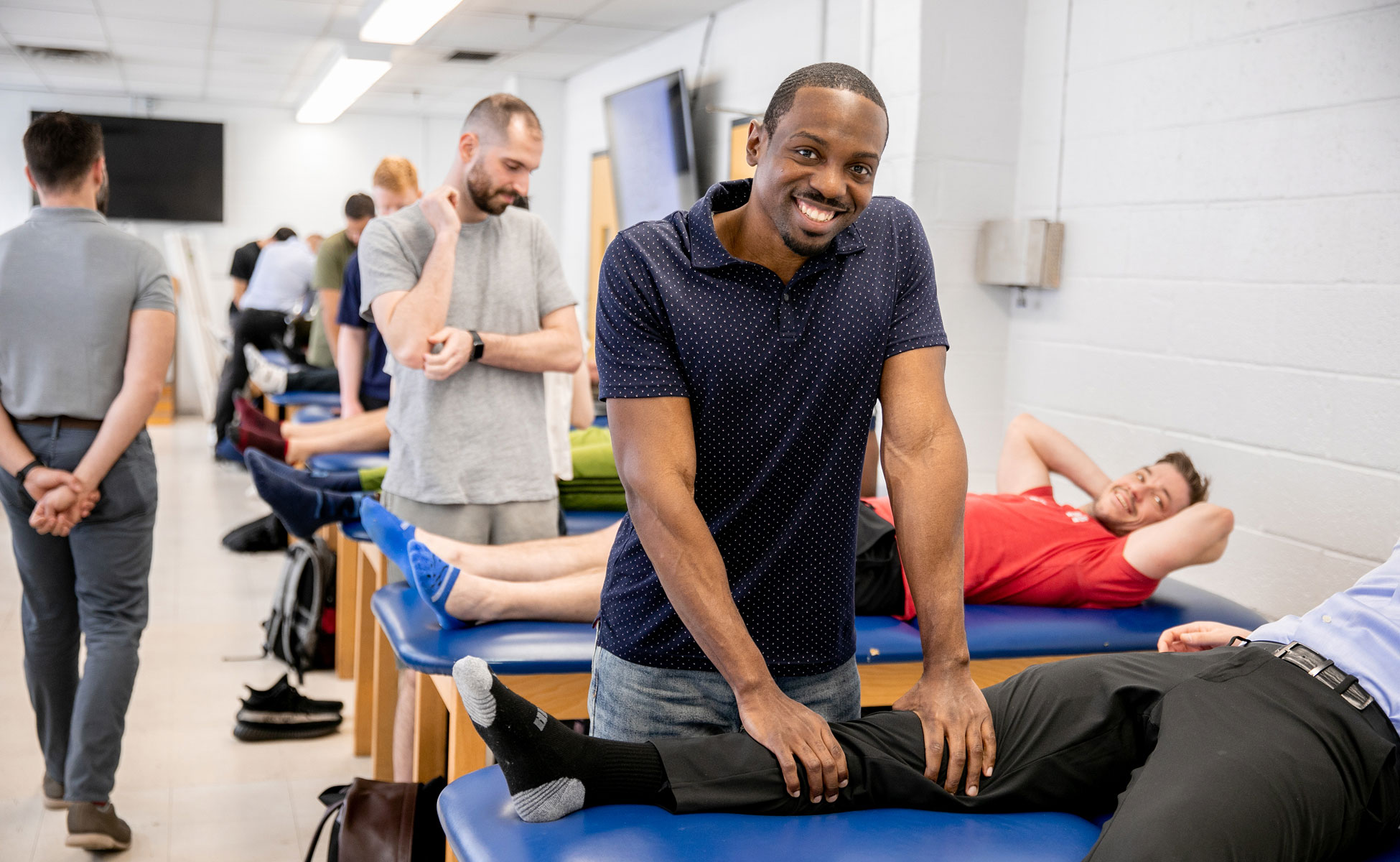The clinical education component of the Doctor of Physical Therapy curriculum allows students to apply the knowledge and skills learned in the classroom to patients in various health care settings.
Under the supervision of a clinical instructor, students are exposed to sub-disciplines of physical therapy such as orthopedics, pediatrics, neurology and geriatrics, as well as specialty areas like sport therapy, aqua therapy, dance rehabilitation and treatment of veterans.
PT in Practice: Learning in the Clinical Environment
[DESCRIPTION] Screen with text and School of Health Sciences logo.
[TEXT] HEALTHCARE HEROES GET THEIR START AT TOURO
[DESCRIPTION] Reema Thakkar speaks to the camera with a plain background.
[TEXT] Dr. Reema Thakkar, Director of Clinical Education
[Reema Thakkar] The Touro University Doctor of Physical Therapy program currently has 800 clinical sites that we are in contracts with and our relationships allow our students to have experiences like no other place.
[DESCRIPTION] Cristina Casimiro speaks to the camera with a plain background.
[TEXT] Cristina Casimiro, Physical Therapy Student
[Cristina Casimiro] Touro University has a bunch of contracts that they already have made with all these clinics.
[Reema Thakkar] We have these sites all across the US, and our students get to learn from the best of the best.
[DESCRIPTION] A PT student works with Dr. Laura Hagan in a simulation Physical Therapy session. A student actor lies on a physical therapy table while the other student manipulates their legs for PT.
[Reema Thakkar] I really believe that learning in the clinical environment for a healthcare profession is so amazing. They go on four different clinical experiences during their time here, and we place them at amazing centers.
[DESCRIPTION] Students work in a classroom setting, practicing lifting patients onto a Sit-to-Stand lift, which teaches people to walk again.
[Reema Thakkar] So you learn for a few semesters, then you go out to a clinic, practice what you learn, and you see patients, and then you come back and you learn some more.
[Cristina Casimiro] Having a set of courses and then being able to go out into the clinic and practice those skills that we had just learned is super helpful. Instead of just learning it all at once, we're just able to apply it, and then it just becomes second nature to us.
[DESCRIPTION] Students practice checking blood pressure of other students while engaging in friendly conversation.
[Laura Hagan] We have so many different experiences to choose from.
[DESCRIPTION] One student wears a stethoscope to listen to the mock patient’s heart beat.
[Cristina Casimiro] You're able to just select which one you want to go to the most, and you rank them 1-10.
[DESCRIPTION] Robby Tolentino speaks to the camera with a plain background.
[TEXT Robby Tolentino, Physical Therapy Student
[Robby Tolentino] The staff does an amazing job with setting up the students into the clinicals that we are interested in the most.
[DESCRIPTION] Laura Hagan speaks to the camera with a plain background.
[TEXT] Dr. Laura Hagan, Director, Manhattan Campus
[Laura Hagan] It's a small program, so you're not going to be just a number. You're not going to be one of many.
[DESCRIPTION] Students practice lifting patients and setting them down in wheelchairs.
[Robby Tolentino] Having the extensive training from this program has really prepared us well.
[DESCRIPTION] Students practice manipulating arms in a PT session, working with fellow classmates and a skeleton model.
[Robby Tolentino] In the classroom at Touro, there's a lot of clinical applicability, whether that be hospital, whether that's the sports rehab clinic, the outpatient orthopedic clinic, different clinics that will really set us up to get into that field. And from there, we're able to apply what we know in the classroom, and it seamlessly can be applied to our clinical affiliations.
[DESCRIPTION] Students in various PT-style settings practice with catheter tubes, manipulation of arms in a classroom setting, and practicing walking with a patient that requires a walker and oxygen through a hallway.
[Robby Tolentino] When we do all this training and practice, it just primes me for the clinic to be as well prepared as possible. Knowing different special tests is something that I applied a lot, and then making sure I'm able to have the right diagnosis for my patients based on these special tests that I know of. So it really sets us up perfectly for the clinic.
[DESCRIPTION] Professor and student observe a patient-doctor interaction video recording and review it on a laptop screen.
[Laura Hagan] What we do are patient simulations. Actors play the part of the patient. The students engage with that person as if they were the patient. So they may be doing an interview with that patient. They may be doing a patient evaluation.
[DESCRIPTION] Students study in a modern lounge setting, reviewing a textbook and a model foot. Professor and student speak to each other at a desk, while looking at a laptop together.
[Laura Hagan] It mimics the real-world environment. So they can practice, they can learn, they can make those mistakes. And then when they go into the clinic, it's not like the first time they've done it.
[DESCRIPTION] Students assisting mock patient with crutches go up stairs. Students practice putting on oxygen tubes. Students practice moving a patient on a bed.
[Laura Hagan] We really do try to get to know all of our students, and we want to see everyone succeed and become amazing physical therapists.
[DESCRIPTION] Screen with text and School of Health Sciences logo.
[TEXT] HEALTHCARE HEROES GET THEIR START AT TOURO
[DESCRIPTION] Blank screen with School of Health Sciences Touro University logo.
(Music Fades)
Clinical Education Experiences
Students in the DPT Program participate in four clinical education experiences, which begin after successful completion of the first three semesters.
- Clinical Affiliation I - A 6-week experience after the third semester
- Clinical Affiliation II - An 8-week experience after the fourth semester
- Clinical Affiliation III - An 8-week experience after the fifth semester
- Clinical Affiliation IV - The final clinical experience lasting 16 weeks after completion of the sixth and final semester.
We are affiliated with over 300 healthcare facilities on Long Island, in the five boroughs of New York City, and in New Jersey, as well as with various sites across the country. Students have the opportunity to experience a variety of different settings including hospitals, rehabilitation centers, schools, private practices, and skilled nursing facilities. If a student wishes to be placed at a site with which we are not presently affiliated, we will make every effort to establish a relationship with that site.



